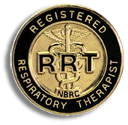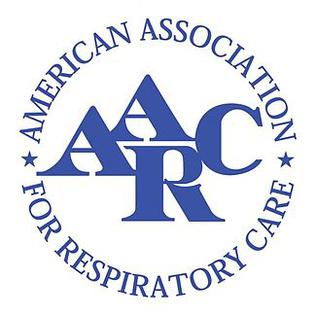Related Research Articles
CRT may refer to:

Physical therapy (PT), also known as physiotherapy, is a medical practice that remediates impairments and promotes mobility and function by using mechanical force and movements, manual therapy, exercise therapy, and electrotherapy. Physical therapy is used to improve a patient's quality of life through examination, diagnosis, prognosis, physical intervention, and patient education. It is performed by physical therapists.

A respiratory therapist is a specialized healthcare practitioner trained in pulmonary medicine in order to work therapeutically with people suffering from pulmonary disease. Respiratory therapists graduate from a community college or university with a certification in respiratory therapy and have passed a national board certifying examination. The NBRC is the not-for-profit organization responsible for credentionaling the seven areas of Respiratory Therapy.

Music therapy is the use of music to improve clients' quality of life. Music therapy is an evidence-based, clinical use of music interventions. The music therapist uses music and all of its facets—physical, emotional, mental, social, aesthetic, and spiritual—to help clients improve their health and quality of life. Music therapists primarily help clients improve their health in several domains, such as cognitive, motor, emotional, communication, social, and educational by using both active and receptive music experiences such as improvisation, re-creation, composition, and receptive methods and discussion of music to achieve treatment goals. There is a wide qualitative and quantitative research literature base for music therapy. Music Therapy is distinctive from Musopathy which relies on a more generic and non-cultural approach based on neural, physical and other responses to fundamental aspects of sound.

Occupational therapy (OT) is the use of assessment and intervention to develop, recover, or maintain the meaningful activities, or occupations, of individuals, groups, or communities. It is an allied health profession performed by occupational therapists and Occupational Therapy Assistants. OTs often work with people with mental health problems, disabilities, injuries, or impairments.

Drama therapy is the use of theatre techniques to facilitate personal growth and promote mental health. Drama therapy is used in a wide variety of settings, including hospitals, schools, mental health centers, prisons, and businesses. Drama therapy, as a modality of the creative arts therapies, exists in many forms and can be applicable to individuals, couples, families, and various groups.
Person-centered therapy, also known as person-centered psychotherapy, person-centered counseling, client-centered therapy and Rogerian psychotherapy, is a form of psychotherapy developed by psychologist Carl Rogers beginning in the 1940s and extending into the 1980s. Person-centered therapy seeks to facilitate a client's self-actualizing tendency, "an inbuilt proclivity toward growth and fulfillment", via acceptance, therapist congruence (genuineness), and empathic understanding.

A registered respiratory therapist (RRT) is a certification for respiratory practitioners. In the United States, the certificate for the RRT is issued by the National Board for Respiratory Care after passing the NBRC-WRE and NBRC-CSE examinations. Eligibility for the NBRC RRT examinations are both previously passing the entry-level examination for the certification of Certified Respiratory Therapist, the NBRC-ELE, and holding at least an Associate of Science in Respiratory Care. In Canada the RRT certification is granted by examination from the Canadian Society of Respiratory Therapists. Internationally, respiratory care is governed by local governments and certification or license to practice as a respiratory practitioner is managed locally without the use of separate organizations as in the United States and Canada.
A Certified Respiratory Therapist (CRT), formerly Certified Respiratory Therapy Technician (CRTT), is a therapist who has graduated from a respiratory therapy program at a university or college and has passed a national certification exam. A CRT or RRT is typically expected to adjust, modify or recommend therapeutic techniques within well-defined procedures based on a limited range of patient responses. In the healthcare setting, usually required supervision by a physician experienced in respiratory care.

The American Association for Respiratory Care (AARC) is a non profit organization and is the only professional organization supporting Respiratory Care in the United States. In addition to attempting to help lobby for beneficial legislation nationally and locally, the AARC is trying to promote the profession as a whole to increase interest and membership. The AARC began in 1943, as the Inhalation Technician Association and has evolved rapidly and repeatedly since.
The National Board for Respiratory Care (NBRC) Inc. is a non-profit organization formed in 1960 with the purpose of awarding and maintaining credentialing for Respiratory Therapists in the United States. The NBRC is the only organization in the United States which develops certification examinations for Registered Respiratory Therapists (RRTs) and Certified Respiratory Therapists (CRTs). The NBRC also offers additional specialization credentialing for respiratory practitioners that hold its certifications. The CRT and RRT designations are the standard credential in respiratory care for licensure requirements in the portions of the United States that have enacted a Respiratory Care Act. States that license respiratory therapists sometimes require the practitioner to maintain their NBRC credentialing to maintain their license to practice. The NBRC is headquartered in Overland Park, Kansas. It has been in the Kansas City metropolitan area since 1974. The NBRC is located at 10801 Mastin St, Suite 300, Overland Park, KS 66210.
A Sleep disorder specialist (SDS) is a Registered Respiratory Therapist (RRT-SDS) that has successfully passed the certification examination NBRC-SDS. The respiratory therapist may also be a Certified Respiratory Therapist (CRT-SDS) under certain conditions. The sleep disorder specialist scores and performs polysomnography and also assists in diagnosing and preparing a treatment plan for the condition. Some of the conditions the sleep disorder specialist helps evaluate and treat are; insomnia, sleep apnea, restless legs syndrome, and narcolepsy.
Healthcare professional credentials are credentials awarded to many healthcare practitioners as a way to standardize the level of education and ability to provide care.
A College of Respiratory Care is a type of educational institution, or part thereof, providing education and training to become a fully qualified respiratory practitioner. The nature of respiratory care education and respiratory practitioner qualifications varies considerably across the world.
An Associate of Science in Respiratory Care (ASRC) is an entry-level tertiary education respiratory therapy degree. In the United States, this type of degree is usually awarded by community colleges or similar respiratory schools. Some four year colleges also offer this degree. Students in the United States awarded an Associate of Science in Respiratory Care are qualified to sit for the NBRC-ELE and then the NBRC-WRE and NBRC-CSE then apply for state licensure as a Registered Respiratory Therapist.
The College and Association of Respiratory Therapists of Alberta is a corporation with delegated provincial government authority to regulate the profession of respiratory therapy pursuant with the Health Professions Act and the Respiratory Therapists Profession Regulation.
References
- ↑ C.C.S.M. c. R115, The Registered Respiratory Therapists Act, http://marrt.olasoft.com/uploaded/31/web/R115%20RRT%20Act.pdf